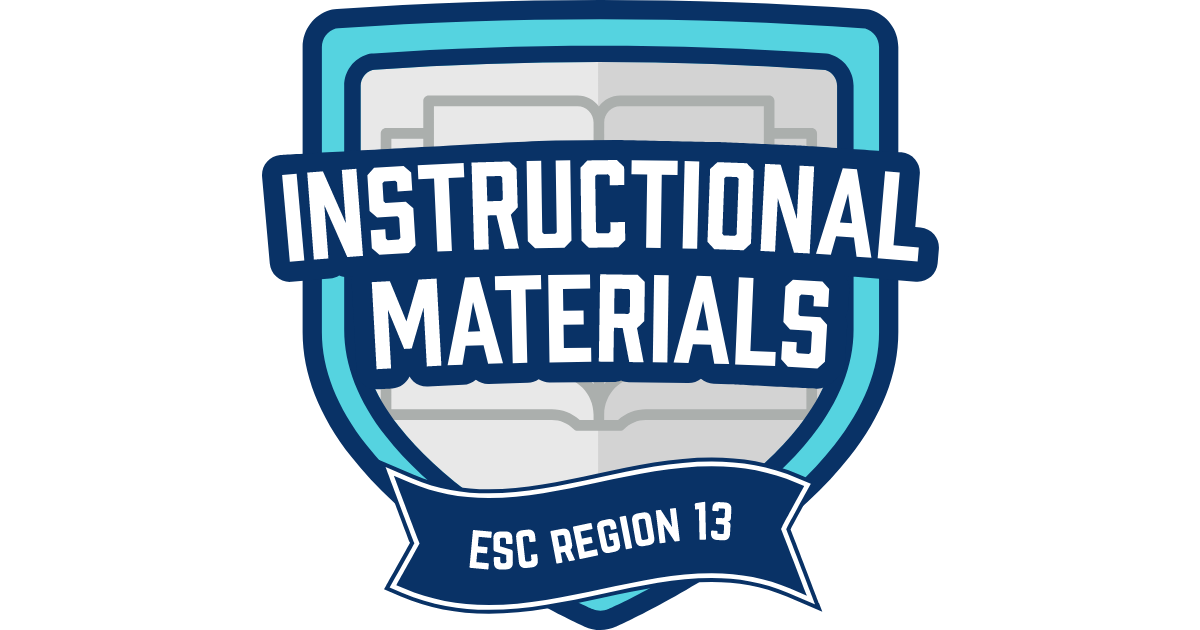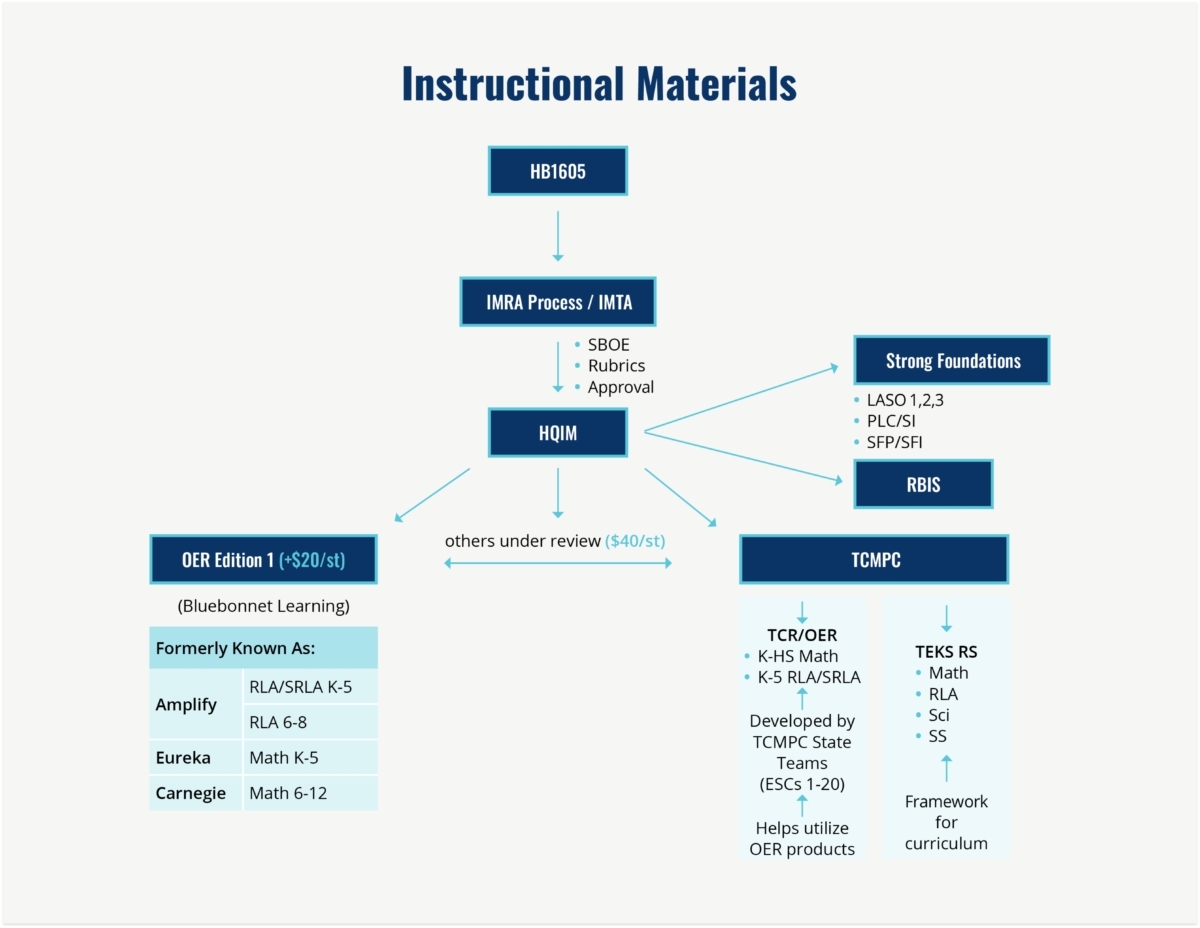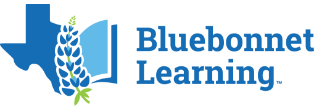Instructional Materials

According to the Texas Education Code 31.002, "Instructional Material" means content that conveys the essential knowledge and skills of a subject in the public-school curriculum through a medium or a combination of media for conveying information to a student. This includes use by teacher, principal, or student.
According to TEA, Instructional Materials are any medium or a combination of media that convey the Texas Essential Knowledge and Skills (TEKS) of a subject in the public-school curriculum to a student, including materials such as lesson plans or grading rubrics. Texas Education Agency (TEA) supports and coordinates the review and approval of instructional materials by the State Board of Education (SBOE), as well as provides oversight for their statewide use.
This page provides:
- Guidance and context to the process for materials review while defining the relationship between High Quality Instructional Materials, Open Education Resources, and Bluebonnet Learning.
- Information on Strong Foundations, LASO, and Research Based Instructional Materials.
- Identifies the interaction between Texas Curriculum Management Program Cooperative (TCMPC), Texas Curriculum Resources (TCR), and TEKS Resource System (TEKS RS).
ESC Region 13 is positioned to assist each district with understanding, internalizing, and implementing High Quality Instructional Materials, along with the identified programs, products, and platforms. While the instructional materials decision is a local decision, Region 13 will support whichever choice is made by our districts.
Identifying the Connections

Instructional Materials Review and Approval (IMRA)
The new Instructional Materials Review and Approval (IMRA) process replaces the former SBOE Proclamation and Texas Resource Review (TRR) processes. IMRA was enacted under HB 1605 and brings new components to a single, SBOE-governed review of instructional materials. It outlines how instructional materials will be reviewed, though the SBOE has final authority on approvals, the process, and the criteria used.
The IMRA process involves a variety of stakeholders, including the SBOE, trained IMRA reviewers, TEA staff, and the public. Each stakeholder has a different role in the process but all work toward the same goal of delivering a final review report on all submitted materials.
Following the review of instructional materials, the SBOE will vote to determine which materials to add to a list of approved instructional materials. Any instructional materials added to that list will be eligible for the new funding entitlements.
As per HB 1605, the Instructional Materials and Technology Allotment (IMTA) was restored. The IMTA can be used to purchase instructional materials, technological equipment, certain related software, systems, and services, and salaries for specific technical support employees, as described in Texas Education Code (TEC), Chapter 31 Instructional Materials and Texas Administrative Code §66.1307.
In addition to IMTA, HB 1605 established two new Foundation School Program (FSP) entitlements for SBOE-approved instructional materials:
- SBOE-Approved Instructional Materials Allotment (TEC, §31.022 and TEC, 48.307): supports the purchase of high-quality instructional materials (HQIM) approved by the State Board of Education; public school systems are entitled to $40 per student per year.
- Open Education Resources Printing Allotment (TEC, §48.308): any school district that chooses Texas OER is entitled to an additional $20 per student to cover the costs of printing the textbooks.
To learn more about the IMRA process, visit the SBOE IMRA Webpage. You can also view the SBOE IMRA Cycle 2024 Timeline.
View Materials
- View Pre-Adoption Electronic Samples on TEA website - This information is coming soon. Please check back for more about the samples and links to view them.
- View Samples at Region 13 - Contact us to schedule an appointment.
Current IMRA Cycle
IMRA Cycle 2025 includes:
- K–6 full-subject, tier-one English Language Arts and Reading (ELAR)
- K–6 full-subject, tier-one Spanish Language Arts and Reading (SLAR)
- K–3 partial-subject, tier-one English and Spanish phonics
- K–12 full-subject, tier-one and supplemental Mathematics
Instructional Materials Publisher Showcase
ESC Region 13 hosts an Instructional Materials Publisher Showcase annually to allow publishers in the current adoption year to showcase their products, answer questions, and provide additional information to assist districts in choosing the products that most meet their district needs. Digital samples may be viewed from any location through the TEA website.
Proposed IMRA Cycle 2026
- Cycle 2026
- Fine Arts K–12
- CTE 6–12
- PCT K–12
- RLA Supplemental K–5
Related Information:
- IMRA Reports - The purpose of the IMRA Reports is to assist districts in selecting high-quality instructional materials. It provides comprehensive and user-friendly information about the quality of instructional materials (HQIM), using evidence captured by Texas educators trained on a Texas-specific quality rubric.
- IMRA Multi-Year Plan
High-Quality Instructional Materials (HQIM)
According to the TEA “HQIM will be defined by the Instructional Materials Review and Approval (IMRA) process set up by House Bill (HB) 1605. All materials will require official review in the IMRA process by the State Board of Education (SBOE) to be approved as HQIM.”
High Quality Instructional Materials are curricular resources that:
- Ensure full coverage of TEKS
- Are aligned to evidence-based best practices in the relevant content areas of reading language arts (RLA), math, science, and social studies
- Support all learners, including students with disabilities, English Learners, and students identified as gifted and talented
- Enable frequent progress monitoring through embedded and aligned assessments
- Include implementation supports for teachers
- Provide teacher and student-facing lesson-level materials
HQIM enables students to connect more profoundly and meaningfully with the Texas standards, while also assisting teachers in providing all students access to research-based, high-quality, rigorous grade-level content. Student outcomes improve when students have greater access to:
- Grade-appropriate assignments
- Strong instruction
- Deep engagement
- Teachers with high expectations
Strong Foundations (SF) and LASO
TEA Strong Foundations is a grant program that Local Education Agencies (LEAs) can apply for to assist with the preparation and implementation of high-quality instructional materials. Currently, support is being provided in the following content areas: SLAR and RLA K-5, K-5 Math, and 6-12 Math.
LASO
The Learning Acceleration Support Opportunities (LASO) strategically batches grant funding opportunities that support continued learning acceleration and innovation opportunities. The LASO program grants are anchored in: Strategic Planning, Instructional Materials (HQIM), Teacher Pipelines, More Time, and Innovative School Models.
Two of the decisions available through the LASO 1, LASO 2, and LASO 3 grants are Strong Foundations Planning and Strong Foundations Implementation.
- Strong Foundations Planning requires writing an instructional framework for either Math or Literacy. RBIS training is a major component of that work and frameworks are aligned to the RBIS. Using the OER products is not required to participate in the planning grant.
- Strong Foundations Implementation provides training and coaching support for districts already implementing the OER products.
NOTE: Campuses identified as School Improvement will be encouraged to apply for the Strong Foundations Implementation SI PLC Supports Grant through LASO 3.
LASO 3 Strong Foundations Grant Information and Timeline
- General Webinar | October 1, 2024 and October 3, 2024
- Application Window | October 14, 2024 - December 13, 2024
- Program Webinar Window | October 17, 2024 - October 25, 2024
- Tentative Award Announcement | February 20, 2025
- eGrants Application | February 20, 2025 - March 24, 2025
- Notice of Grant Award | March 24, 2025 - May 24, 2025
Strong Foundations Planning:
Strong Foundations Implementation + SFI School Improvement PLC Supports Grant:
LASO Cycle 3
LASO 3 Grant Cycle opened on October 14, 2024 and will close on December 13, 2024. It will focus on Instructional Materials, More Time, and Innovative School Models. For more information regarding LASO 3 Grant opportunities, visit the TEA LASO Cycle 3 Grant Page.
The TEA LASO Team, alongside the TEA IT Team, have created an ability for Superintendents to access the LASO 3 application prior to submission. The solution allows Superintendents to review and potentially revise their application, prior to signing and submitting the application. The steps below will provide the opportunity for access:
- Please email LASO@tea.texas.gov to request a “Review Application Link”.
- The LASO team will email the requestor/Superintendent a link to their application, where the Superintendent may proceed to review the preserved responses from the beginning of the application and make any necessary revisions. This process may be repeated until ready to proceed with submission.
- After reviewing and revising (if needed), follow the prompts to then submit the Superintendent signed application. Upon submission, there is an opportunity to download a copy of the completed application.
Learn more about ESC Region 13
Education Service Center Region 13 is an Approved Provider for both the Strong Foundations Planning Grant and the Strong Foundations Implementation Grants. If you have questions or are interested in learning more about what the Region 13 team can do for your district as an Approved Provider, please reach out to Heidi Brittain, HQIM Coordinator or Ami Courville, HQIM Specialist. As part of LASO 3, campuses identified as School Improvement are encouraged to apply for the grant. If you have questions over this aspect of LASO 3, please contact Melinda Marquez, Director of Accountability, Assessment, and Leadership Systems.
Research-Based Instructional Strategies (RBIS)
The purpose of Research-Based Instructional Strategies (RBIS) is to provide educators with the knowledge and skills necessary to effectively implement evidence-based teaching strategies in the classroom. By gaining an understanding of RBIS, educators will be better equipped to individualize the learning experience to support every child.
As part of the broader strategy to significantly increase the number of students in Texas who have access to HQIM, the Texas Education Agency (TEA) has developed a set of RBIS to explain the important shifts in instruction that are required for high-quality, rigorous lessons.
RBIS are described as:
- A set of research-based practices that highlights common misconceptions in the field.
- Topics that require conceptual or philosophical changes in approach to instruction.
- A set of practices that are supported by research and should be present in classrooms, regardless of instructional materials.
- The science of how students best learn math and reading in K-12.
The RBIS also demonstrates why HQIMs are important and what is required to implement them well. RBIS workshops explore essential best practices in RLA and Math with content-specific strategies that are supported by research. These practices should be present in all classrooms, regardless of instructional materials.
ESC Region 13’s HQIM team supports every phase of your HQIM:
- Research-Based Instructional Strategies (RBIS)
- High-Quality Instructional Materials (HQIM) Product Training
- Amplify (RLA)
- Eureka (Math)
- Implementation Support for Leaders
- HQIM Grant Information
To schedule RBIS training through ESC Region 13, please contact Ami Courville or visit our E-Campus website and search for “RBIS”.
Open Educational Resources (OER)
Open Education Resources (OER) are materials where the underlying intellectual property can be used freely. Texas OER developed by TEA are materials where the state either owns the underlying intellectual property or it can be freely used and modified by the state in perpetuity.
Open Educational Resources (OER) are state-developed materials that are aligned with High Quality Instructional Materials standards. Like other HQIM, OER undergo State Board of Education (SBOE) approval to ensure they provide equitable access to a high-quality education for every student in Texas. With OER, the underlying intellectual property is either owned by the state of Texas or can be freely used and modified by the state in perpetuity.
In short, OER are HQIM. Unlike other HQIM, OER materials are made freely available forever in digital form to Texas school districts and educators to use or modify as they see fit. These materials are updated to improve their quality with new versions over time based on feedback from teachers and parents.
OER can be printed to ensure students have access to paper instructional materials. In the future, TEA plans to ensure students have access to printed versions at cost.
 Bluebonnet Learning (OER Edition 1)According to TEA “Bluebonnet Learning are state-developed instructional materials that provide teachers with the tools to foster student success. Developed using the latest cognitive science, Bluebonnet Learning instructional materials cover 100% of the Texas Essential Knowledge and Skills (TEKS) and provide a full suite of resources including scope and sequence, daily lesson plans, and student materials. All Bluebonnet Learning instructional materials are designed to be high-quality, suitable, and grade-level appropriate. All Bluebonnet Learning materials are created with the intention of printing instructional materials for classroom use. As an open education resource, educators, campuses, and/or any individual can access all Bluebonnet Learning instructional materials digitally, for free. Printed copies of Bluebonnet Learning instructional materials, if approved by the SBOE, will be available for school systems to procure in the EMAT system.” |
Texas Curriculum Resources (TCR)
Texas Curriculum Resources (TCR) consists of curriculum documents designed to help Texas educators utilize the Open Education Resources (formerly known as Eureka, Carnegie, and Amplify). These documents include the Vertical Alignment Document and Instructional Focus Document.
The TCR product is under development by the Texas Curriculum Management Program Cooperative (TCMPC) State Team. The TCR resources are written to further develop teacher content knowledge and support planning for OER Math K-HS and ELAR and SLAR K-5. With the new platform, TEKS RS and TCR users can create a yearly, monthly and weekly interactive calendar to keep them on task.
TCR is aligned with the TCMPC to ensure that the state standards are addressed. The TCMPC, formerly known as the TEKS Resource System, provides teachers with a framework for curriculum and assessment resources that align to the state standards. Curriculum, assessment, and technology experts, ESC content specialists, district leaders, and Texas teachers work to provide and maintain up-to-date, TEKS-aligned resources that reflect ever-evolving state priorities.
The TCR and TCMPC can be accessed through one platform, known as Campfire Learning. Districts can choose which resource to use based on grade level and content, but that access needs to be granted by the ESC so that accounts can be activated correctly. To utilize the TCMPC and TCR in your campus/district, please reach out to Wendi Russell for more information and assistance.
To schedule a training, demo, or information session on TCR, please contact Amber Laroche.
Contacts
 | Stacey Durham Director Instructional Development and Support TCR/OER Grant, IMRA, HQIM, Strong Foundations/LASO, RBIS Stacey.Durham@esc13.txed.net | ||
 | Wendi Russell Director Texas Curriculum Management Program Cooperative (TCMPC) TCMPC, TCR, TEKS RS Wendi.Russell@esc13.txed.net | ||
 | Melinda Marquez Director Accountability, Assessment, and Leadership Support School Improvement/LASO 3 SI Grant Melinda.Marquez@esc13.txed.net | ||
 | Amber Laroche Coordinator TCMPC/TEKS RS, IMRA Amber.Laroche@esc13.txed.net | ||
 | Heidi Brittain Coordinator HQIM, Strong Foundations & LASO, RBIS Heidi.Brittain@esc13.txed.net | ||
 | Ami Courville Education Specialist HQIM, OER, Strong Foundations & LASO, RBIS Ami.Courville@esc13.txed.net | ||
 | Bridgette Arnold Education Specialist HQIM, OER, Strong Foundations & LASO, RBIS Bridgett.Arnold@esc13.txed.net | ||
 | Jill Bodling Education Specialist HQIM, OER, Strong Foundations & LASO, RBIS Jill.Bodling@esc13.txed.net |
Contact us to learn more
Enhance your instructional materials and support student learning!
Contact us to learn more
Enhance your instructional materials and support student learning!
Contact us to learn more
Need to get in touch?
Contact a member of our team for more information.
Stacey Durham, 512-919-5163